Technology is transforming the healthcare industry, helping to improve patient care, enhance diagnostics, and streamline hospital operations. Developing effective and patient-focused solutions is the top priority for modern healthcare organizations. However, this process is not without its challenges, ranging from regulatory compliance to resource shortages.
This article covers key aspects of healthcare software development, including tools and technologies driving innovation and challenges associated with the development process. Whether you’re a healthcare tech leader exploring industry trends or a product manager planning to develop or upgrade a solution, this article offers valuable insights to support your decisions.
Contents:
What is healthcare software development?
Healthcare software development focuses on creating digital tools designed to meet the unique needs of healthcare providers, patients, researchers, and administrators. These solutions offer significant value by improving patient care, streamlining administrative operations, and ensuring compliance with industry requirements.
Healthcare software development brings together professionals like software engineers, medical experts, and data scientists to build systems that are both technically advanced and aligned with healthcare requirements.
Common types of healthcare software solutions include:
- Electronic health record (EHR) systems for securely and efficiently managing patient data
- Telehealth platforms to enable remote consultations and care
- Medical imaging software for accurate diagnostics and analysis
- Patient portals give patients easy access to their health information
- Healthcare analytics tools for data-driven decision-making
- Medical billing systems to streamline administrative and financial tasks
The global healthcare applications market was valued at $32.4 billion in 2023 and is projected to grow to $38.9 billion by 2028, with ready-made solutions representing a major portion of this market. While there are numerous off-the-shelf healthcare software solutions available, many organizations choose to develop their own healthcare software to meet their unique needs and challenges. Let’s see what benefits of healthcare software you can leverage from custom development.
Take your healthcare software to the next level with a reliable tech partner by your side
Leverage Apriorit’s rich development expertise to deliver secure, efficient, and cutting-edge solutions.
Why invest in custom healthcare software?
Custom software development for healthcare can offer a wide range of advantages both to healthcare providers and patients. This is what makes custom solutions a preferred choice for healthcare organizations looking to boost their operations and care delivery:
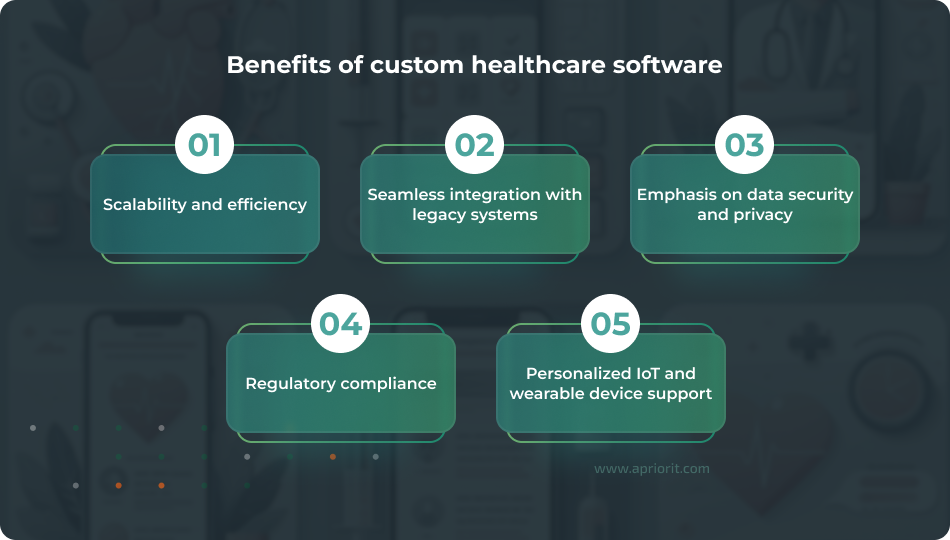
Scalability and efficiency. Tailored software is designed to fit the exact needs of a healthcare organization, eliminating unnecessary features and optimizing resources. This approach reduces long-term costs and allows for easy scaling as the organization grows: for example, by implementing a modular or microservices architecture.
Seamless integration with legacy systems. Unlike off-the-shelf solutions, custom software can be developed to integrate smoothly with existing infrastructure. Such solutions can reduce disruptions and preserve the continuity of operations.
Emphasis on data security and privacy. With the help of custom solutions, you can prioritize advanced security features such as encryption, secure authentication, and regular vulnerability assessments. This can help organizations protect sensitive patient data and minimize the likelihood of security incidents and associated reputational damage.
Regulatory compliance. Even though many off-the-shelf solutions now comply with the requirements of the General Data Protection Regulation (GDPR) and the US Health Insurance Portability and Accountability Act (HIPAA), custom software can provide a more tailored approach to meet specific industry requirements. These may include standards such as the FDA’s 21 CFR Part 11 for electronic records, ISO 13485 for medical device software, or the EU MDR for medical devices.
Personalized IoT and wearable device support. Off-the-shelf solutions have a rather limited range of supported devices. Custom software can accommodate a variety of IoT devices and wearables based on your specific needs, including smartwatches for tracking vital signs, glucose monitors, fitness trackers, ECG monitors, and even advanced medical-grade wearables like blood pressure cuffs and smart inhalers. These solutions can achieve seamless integration and data exchange tailored to the needs of both patients and healthcare providers.
When you choose custom healthcare software development over adopting an off-the-shelf solution, you can gain a competitive edge, enhance patient care, and achieve greater operational efficiency tailored to your specific needs. To achieve these goals, you need to leverage tools that can help you build efficient and innovative solutions.
Read also
IoT Security Challenges and Best Practices
Explore critical aspects of IoT security, including common vulnerabilities and practical solutions. Learn how to protect your connected systems against emerging threats.

Tools and technologies for healthcare software development
At Apriorit, our experts use a wide range of tools and technologies to create software that is secure, efficient, and scalable. Here’s an overview of some key technologies we use for developing healthcare software:
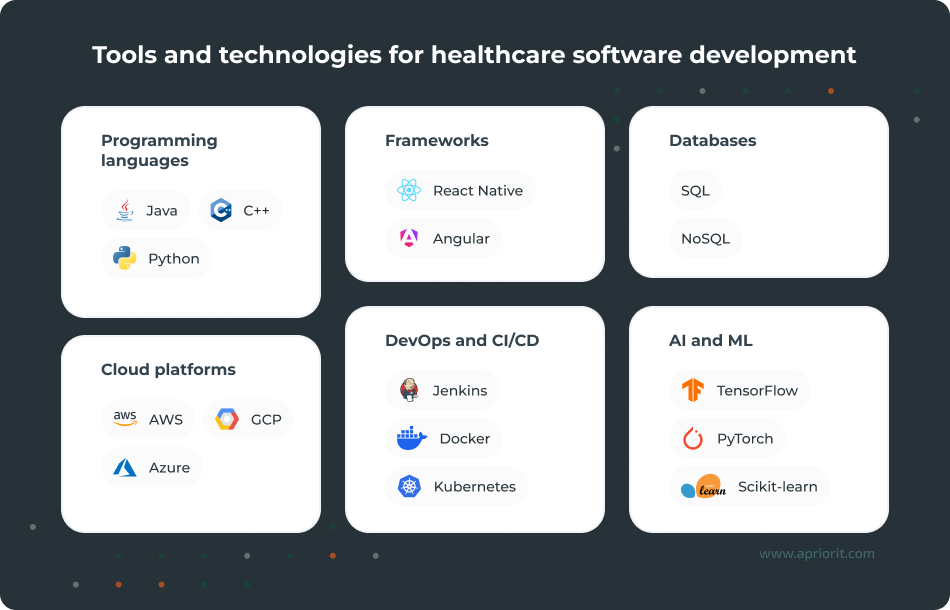
Let’s look closer at each of these categories:
Programming languages
- Python. The simplicity of this language and availability of extensive libraries make it suitable for developing applications involving data analysis, machine learning, and bioinformatics. Python is often used to create healthcare analytics tools that process large datasets to uncover trends and improve patient diagnostics and treatment planning.
- Java. The reliability and scalability of Java make it suited for developing critical healthcare systems like EHR platforms and mobile health (mHealth) apps that require platform-independent functionality.
- C++. This language works well for developing high-performance applications, such as real-time patient monitoring systems and medical imaging software, where speed and precision are important.
Frameworks
- React Native. This framework is suitable for building cross-platform mobile applications, such as telehealth platforms and patient portals, that need to function seamlessly on both iOS and Android devices.
- Angular. This framework’s dynamic capabilities help in developing complex web applications such as healthcare management dashboards and administrative tools that demand scalability and responsiveness.
Databases
- SQL databases such as MySQL and PostgreSQL are commonly used for managing structured healthcare data like patient records, ensuring quick and secure access to critical information.
- NoSQL databases like MongoDB are better suited for handling unstructured data, such as medical images or IoT-generated health metrics, adding flexibility and scalability for innovative healthcare solutions.
Cloud platforms
- Amazon Web Services (AWS) offers many healthcare-specific services, such as AWS HealthLake for storing, transforming, and analyzing healthcare data; Amazon Comprehend Medical for extracting insights from unstructured medical text; and Amazon Elastic Block Store (EBS) for HIPAA-compliant data storage. These tools offer secure and scalable cloud-based solutions for healthcare providers.
- Microsoft Azure provides tools for managing healthcare applications, including Azure API for FHIR for secure data interoperability, Azure Health Data Services for unifying health information across systems, and Azure Machine Learning for building predictive models and analyzing medical data. With the help of AI-powered insights and Azure IoT Hub integration, these tools help organizations improve patient care and operational efficiency.
- Google Cloud Platform (GCP) specializes in advanced data analytics and AI tools, including Cloud Healthcare API, BigQuery, Healthcare Natural Language API, and more. These tools make GCP suitable for developing predictive healthcare models and enhancing medical research.
DevOps and CI/CD
- Jenkins automates development and deployment, allowing medical software development teams to deliver updates quickly while maintaining compliance and quality standards.
- Docker ensures consistent environments for deploying healthcare applications, simplifying testing, and scaling services such as patient portals or telehealth platforms.
- Kubernetes manages containerized healthcare applications, helping with scaling and achieving high availability for critical systems like EHR platforms and analytics tools.
AI and ML
- TensorFlow is widely used in healthcare to develop advanced AI models, such as diagnostic tools that analyze medical images to detect anomalies or diseases.
- PyTorch helps with healthcare research and rapid prototyping of machine learning models for tasks like predicting patient outcomes or drug discovery.
- Scikit-learn helps implement ML algorithms in healthcare analytics, such as by clustering patient data to identify patterns and improve treatment plans.
These tools and technologies can empower healthcare software developers to build secure, efficient, and innovative solutions that address the industry’s evolving needs. We’ve highlighted a basic set of tools we often use. Every project has its own unique challenges and opportunities, so we assess each project’s specific requirements to choose the best tools. Factors like project complexity, timeline, budget, and technologies involved all influence our decisions. As we look to the future, we also need to understand the key trends that will shape the healthcare industry in 2025. Let’s take a closer look at them.
Read also
Adopting Generative AI in Healthcare: Key Benefits, Use Cases, and Challenges
Stay ahead of the curve in healthcare innovation. Explore how generative AI is transforming healthcare innovation with real-world use cases and key challenges to address.
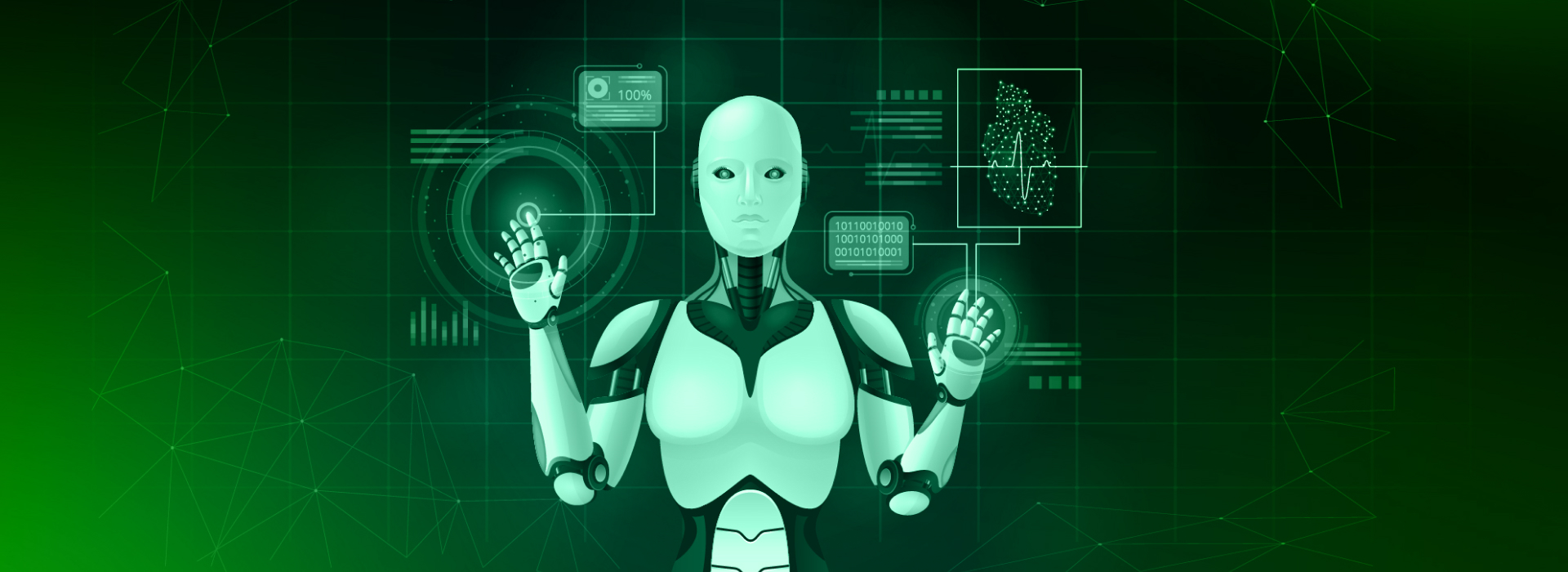
Key trends in healthcare software development in 2025
As the healthcare industry is constantly evolving, staying informed about the latest trends is the best way to remain competitive. Here are some key trends shaping the healthcare software development process in 2025:
- AI and ML. Artificial intelligence and machine learning are revolutionizing diagnostics as they allow for faster and more accurate detection of diseases. From analyzing medical images to predicting patient outcomes, these technologies are improving decision-making and reducing diagnostic errors. AI and ML are also making waves in chatbot development for the healthcare sector.
- IoT and wearable devices. The integration of IoT and wearable technology is providing real-time health monitoring and enhancing the efficiency of personalized care. IoT and wearable devices collect critical health data, opening up opportunities for proactive interventions and improving patient outcomes.
- Cloud computing. Cloud platforms offer scalable and secure solutions for managing healthcare data and applications. They can contribute to seamless data sharing, remote access, and cost-efficient operations, making them indispensable tools for modern healthcare systems.
- Data security. Blockchain technology continues to be the top choice for data security and privacy. By creating tamper-proof records and secure data exchanges, blockchains help healthcare organizations comply with strict regulations and protect sensitive patient information. Other methods, like quantum-resistant encryption protocols, are also becoming increasingly popular for protecting sensitive data.
To learn more about the most recent technology trends that are shaping the healthcare industry, read our article on Top Healthcare IT Trends to Watch in 2025. Staying ahead of these trends, combined with Apriorit’s healthcare software development expertise, can help your organization outrun the competition.
Challenges in healthcare software development
Developing healthcare software presents unique challenges, including strict data protection requirements, data security needs, and integration of advanced technologies. Successfully overcoming these challenges is essential to creating reliable, compliant solutions that improve patient care and optimize operations. Here are the most significant challenges that your team can encounter, as well as strategies to overcome them:
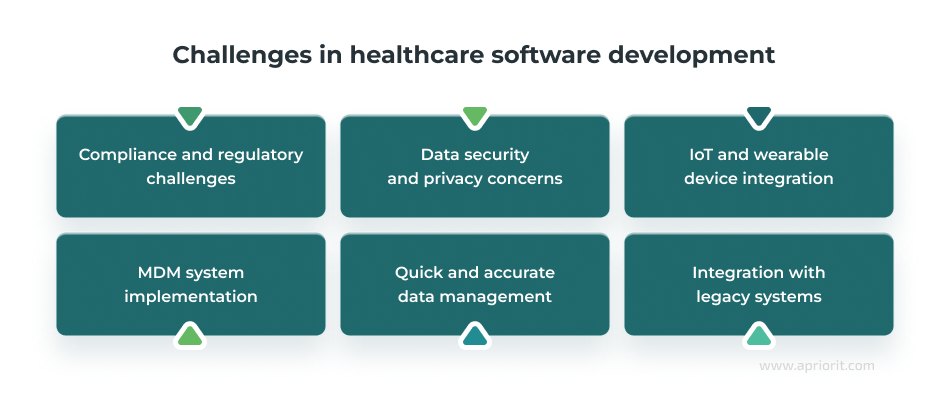
Compliance and regulatory challenges. Requirements of HIPAA, the NHS, the GDPR, the FDA, and other laws, regulations, and agencies govern healthcare software, protecting the confidentiality of patient data and the safety of healthcare systems. Achieving compliance can be complex and time-consuming, as it requires careful documentation, testing, and ongoing monitoring. However, non-compliance may lead to fines and reputational damage.
Many healthcare organizations rely on automated tools and frameworks like OneTrust and Varonis to help maintain compliance by monitoring data handling, ensuring secure workflows, and creating audit trails. However, these tools are not a substitute for building compliance into the software from the ground up. They can only sustain existing compliance but cannot retroactively make a system compliant with regulations like GDPR or HIPAA if the initial software design does not meet those standards. Therefore, compliance must be integrated into the software’s architecture during the design and development phases to ensure these tools can function effectively.
What can be done? To address compliance challenges, your team needs to build software with a deep understanding of the regulatory requirements it should meet from the outset. This includes conducting thorough business analysis and requirements elicitation before the start of development.
Data security and privacy concerns. With healthcare becoming increasingly digital, protecting sensitive patient information from breaches and cyberattacks is a top priority. Threats like ransomware and phishing attacks can compromise data integrity and break patient trust.
What can be done? To boost data security, your team can implement end-to-end encryption, deploy intrusion detection systems, and conduct regular security audits. Some technologies like the blockchain can also help you maintain tamper-proof records and securely exchange data. Additionally, implementing role-based access control and encryption will assist your teams with secure, regulatory-compliant data handling from the ground up. Finally, advanced identity verification tools like biometric authentication can add an extra layer of security to sensitive systems.
IoT and wearable device integration. Each device may operate on different standards, protocols, and security levels, complicating seamless data exchange and system compatibility as well as creating cybersecurity risks for healthcare data. For instance, a device might send data in a format that is incompatible with your EHR system or lack support for healthcare-specific standards.
What can be done? Your development team can use interoperability standards like HL7 or FHIR to effectively integrate IoT devices. To ensure reliable data transmission, you can implement secure communication protocols such as MQTT or CoAP at the communication layer between IoT devices and the cloud or server infrastructure. There are many cloud platforms tailored for IoT, such as AWS IoT Core and Azure IoT Hub, that can help your team manage devices, collect data, and maintain security.
MDM system implementation. Managing devices used by healthcare personnel and administrators is important for ensuring operational efficiency and data security. However, implementing and maintaining a robust mobile device management (MDM) system can be challenging because of the wide range of devices, security requirements, and regulatory compliance requirements.
What can be done? Some off-the-shelf MDM solutions like VMware Workspace ONE and Microsoft Intune allow administrators to manage devices, enforce security policies, and ensure compliance with healthcare regulations. For your organization, a custom MDM implementation tailored to healthcare needs can include secure app management and remote wipe capabilities for lost or stolen devices.
Quick and accurate data management. Healthcare systems handle massive amounts of patient and operational data. Accessing, processing, and ensuring the accuracy of such data can be challenging for your teams because of the volume, variety, and velocity of data being processed, especially when working with unstructured or real-time data.
What can be done? Your teams can leverage advanced data management systems, such as NoSQL databases for unstructured data and SQL systems for structured data, to optimize data handling. AI-powered tools like Apache Kafka or Apache Spark can process and analyze data in real time, improving decision-making and operational efficiency.
Integration with legacy systems. Many healthcare providers rely on outdated systems that are difficult to replace due to high costs and operational impact. Integrating new software with these legacy systems while maintaining data consistency and functionality is a major issue.
What can be done? Middleware solutions such as Apache Camel and Mirth Connect facilitate smooth integration between legacy and modern systems. Your teams can use APIs designed for legacy environments to enable secure data sharing and extend the functionality of older systems without replacing them entirely. Proper planning can also help your teams identify potential compatibility issues and address them proactively.
To overcome these challenges, you need a combination of strategic planning, experience with cutting-edge technologies, and industry expertise. Apriorit can help you tackle these challenges and create custom healthcare software based on your requirements.
Related project
Building an AI-based Healthcare Solution
Explore our success story of developing a cutting-edge AI healthcare solution for our client. We managed to integrate advanced analytics and innovative tools to optimize clinical decision-making and improve healthcare service delivery.
How Apriorit can help you with healthcare software development
At Apriorit, we specialize in creating custom software solutions tailored to the unique needs of providers and administrators. Our team has extensive experience developing secure, efficient, and innovative healthcare applications that take into account all the complexities of this industry.
Our expertise in healthcare software development includes:
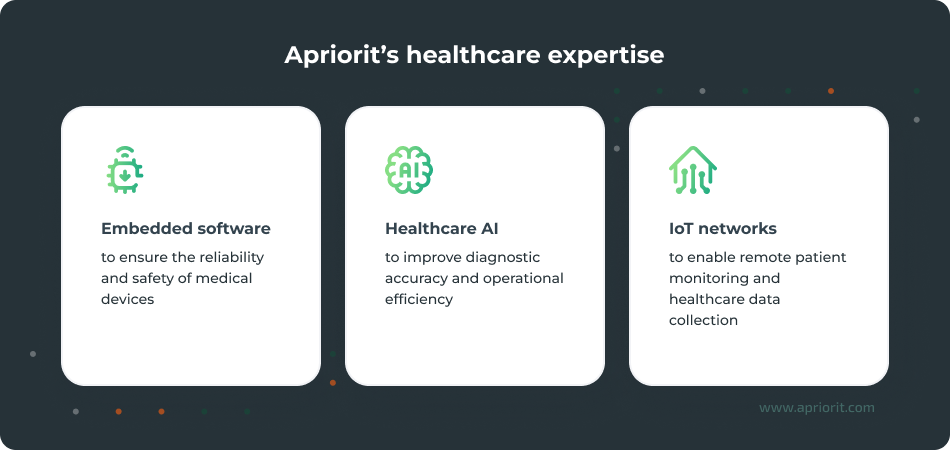
We prioritize compliance and security to protect patient data and adhere to industry requirements. Our team is well-versed in HIPAA, the GDPR, and other relevant laws and regulations.
In addition to custom software development, we offer a range of additional services, including:
- Quality assurance. Benefit from rigorous testing processes that make sure your software is reliable, high-performing, and ready to meet your users’ needs.
- Legacy system modernization. Seamlessly transition your outdated systems to modern technologies and architectures, improving efficiency and compatibility.
- Maintenance and support. Enjoy peace of mind with ongoing support and updates that keep your software secure, up to date, and aligned with evolving industry standards.
- Advanced technology integration. We bring modern solutions to older systems, incorporating IoT, artificial intelligence, and machine learning to improve operational workflows and enhance data management.
By combining our technical expertise, focus on compliance, and commitment to innovation, Apriorit helps healthcare organizations build software solutions that exceed their expectations.
Conclusion
Healthcare software development comes with unique challenges, from meeting strict compliance requirements and ensuring data security to integrating advanced technologies like IoT and AI. Overcoming these challenges can help you deliver a reliable solution that improves patient care, streamlines your operations, and complies with industry standards.
By investing in custom healthcare software development, you can build a product that meets your business’s current needs, drives innovation, and helps you stay ahead in a competitive market. However, building such a solution requires a trusted and experienced software engineering partner.
At Apriorit, our skilled software developers combine deep technical expertise, proven development and testing methods, and a strong focus on compliance and security to help you build software that achieves your goals. Whether you need a new solution, an advanced technology integration, or a system upgrade, we’re ready to bring your ideas to life.
Transform your healthcare services with our expertise
Partner with Apriorit to build secure, compliant, and cutting-edge healthcare solutions that drive better outcomes for patients and providers.


